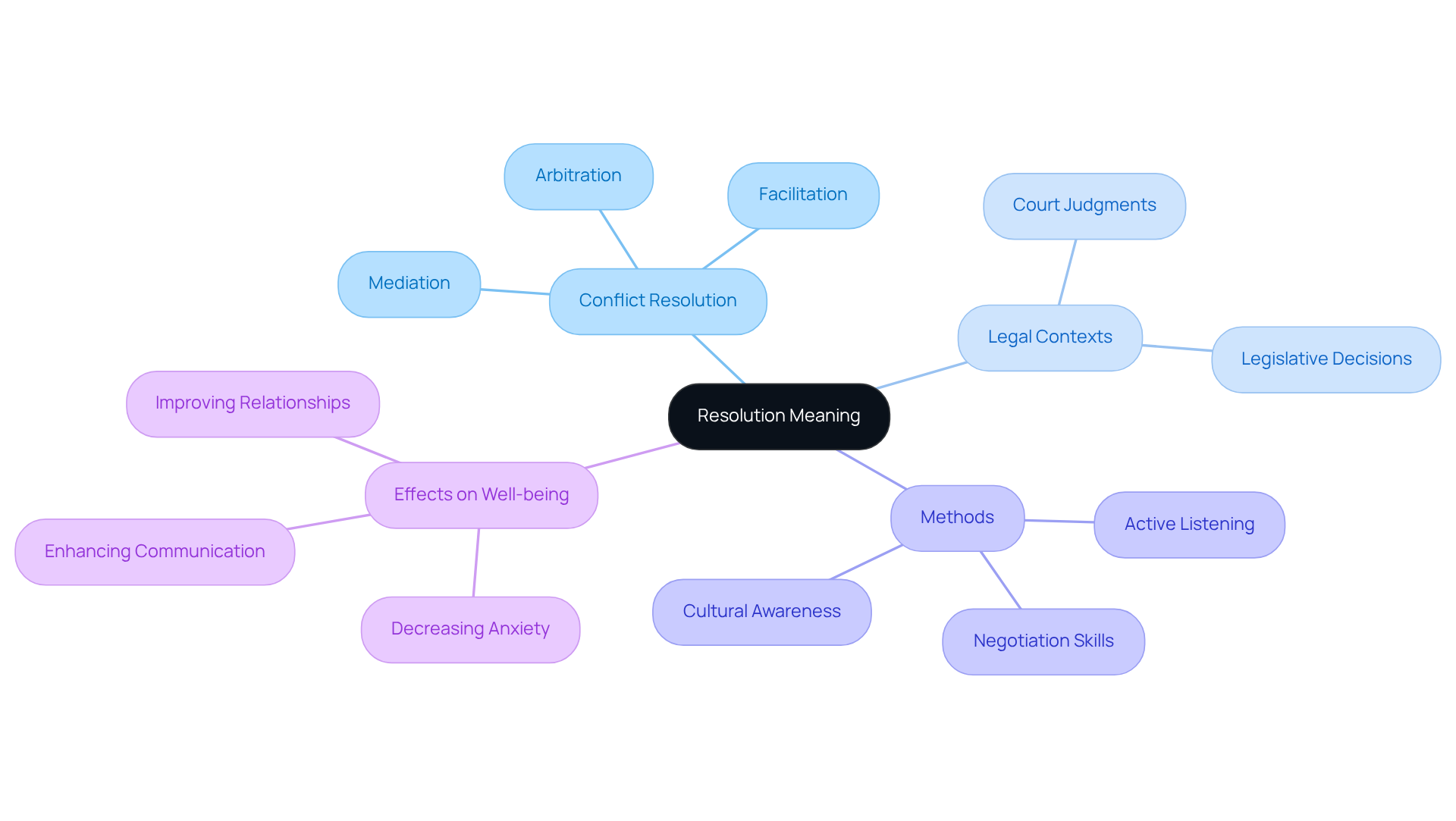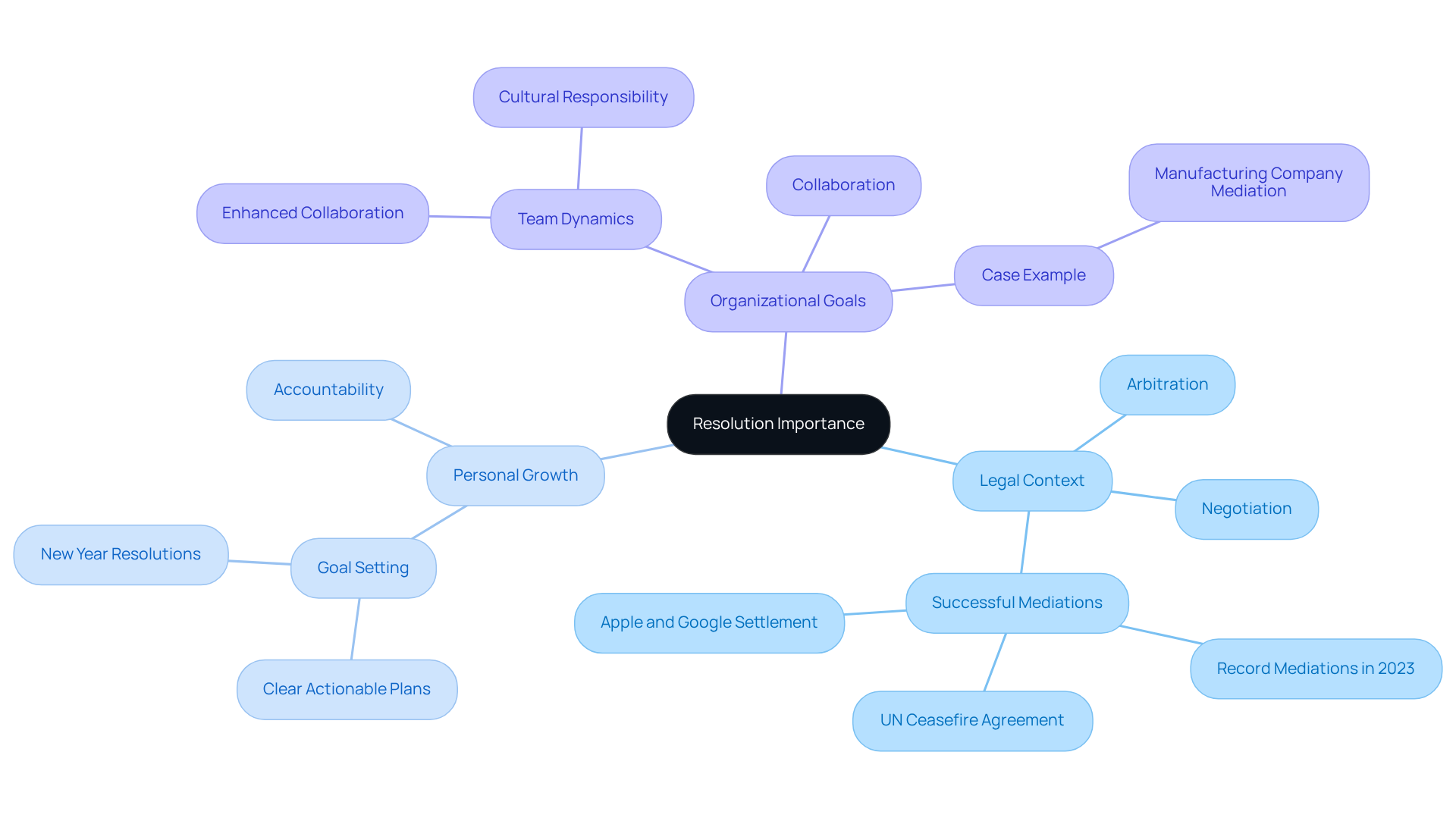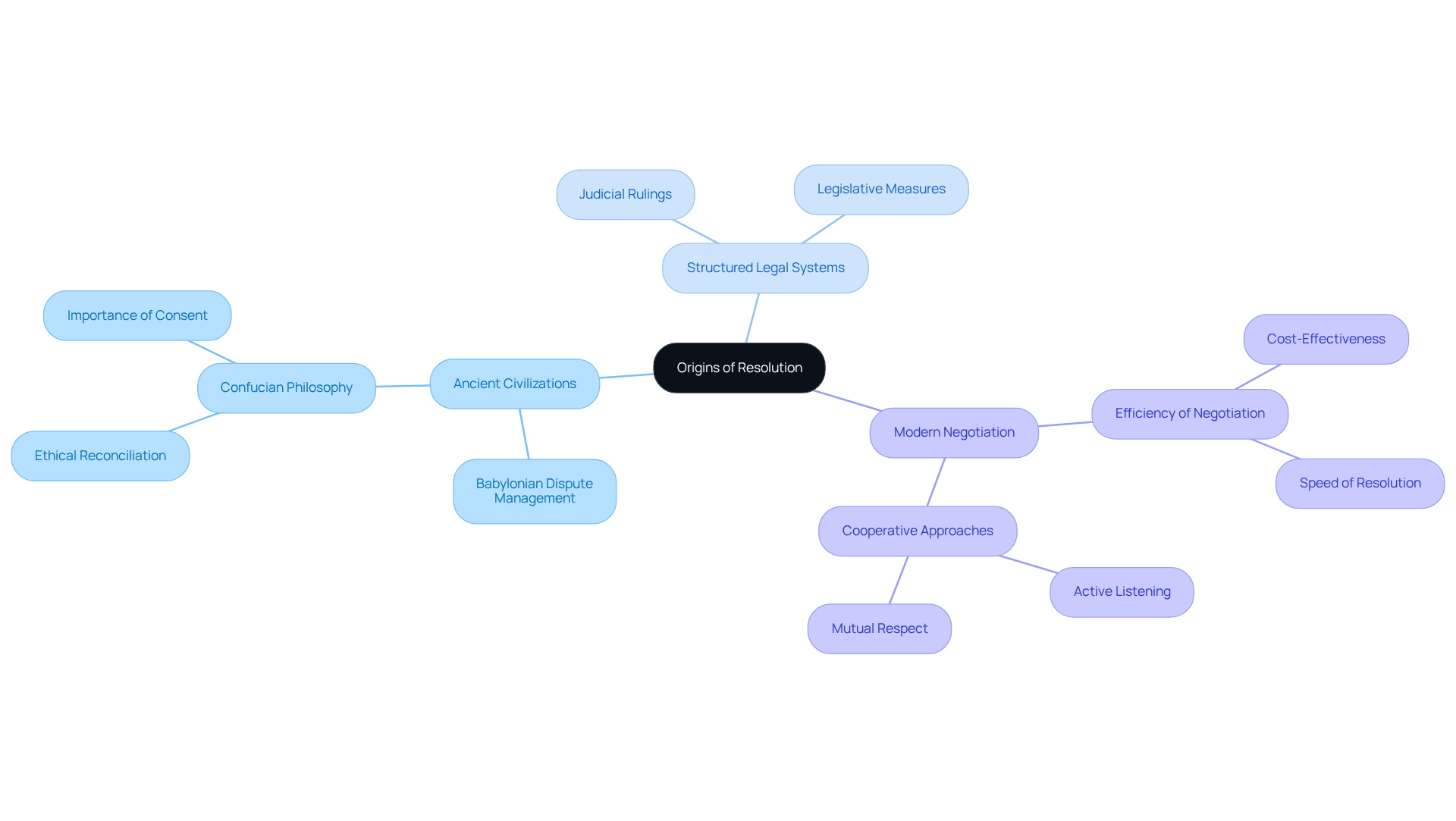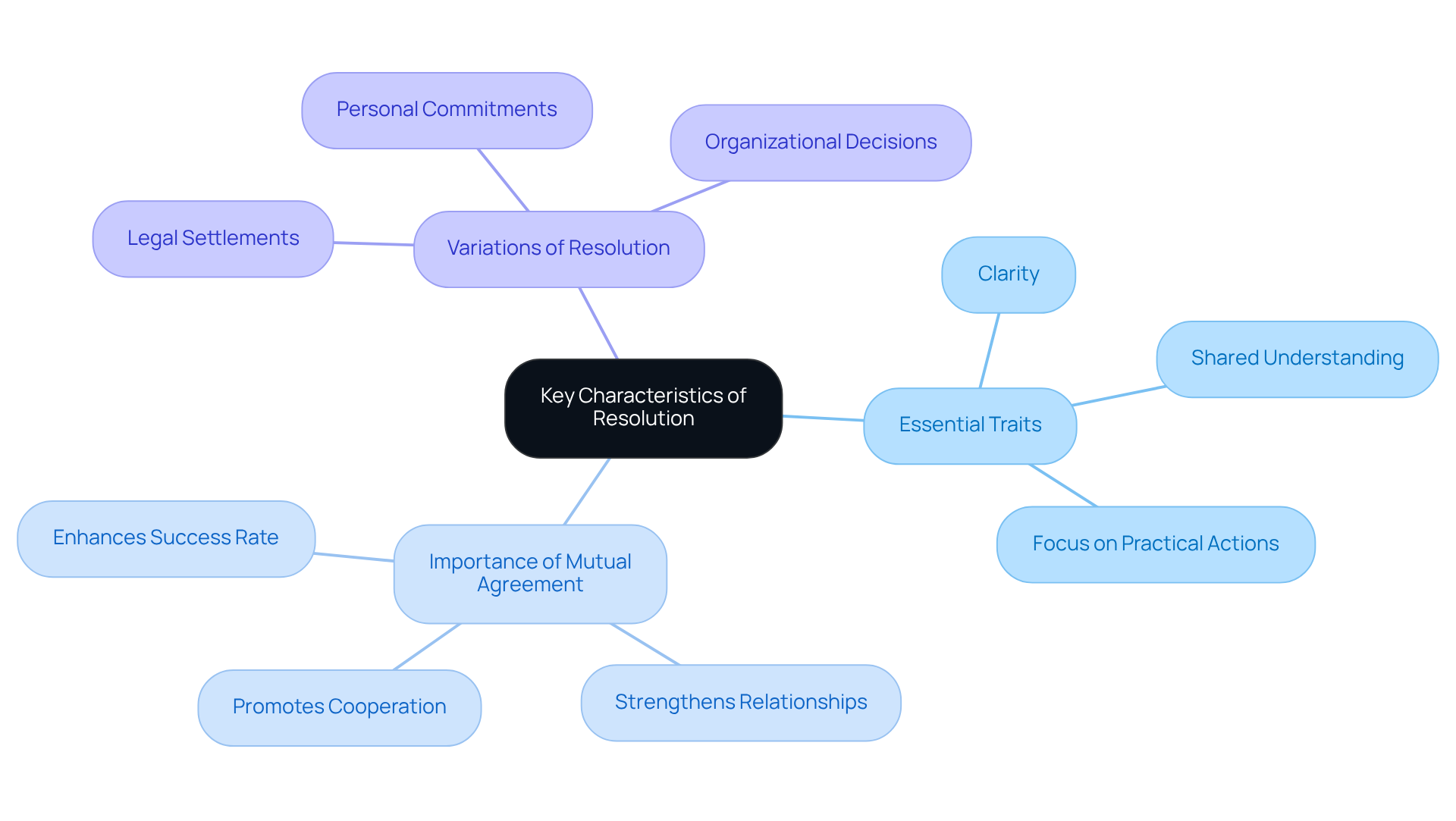
Understanding Resolution Meaning: Context, Origins, and Key Traits
Overview
This article delves into the meaning of resolution, highlighting its crucial role in resolving conflicts through compassionate methods like negotiation, mediation, and arbitration. Have you ever found yourself in a situation where a disagreement seemed insurmountable? We understand that these moments can be challenging. By exploring the historical evolution of resolution practices, we can see how effective they have been in achieving consensus. Clear communication and mutual agreement are essential in fostering successful outcomes, whether in personal relationships, legal matters, or organizational settings.
Imagine a world where conflicts are addressed with understanding and care. The benefits of mediation and arbitration extend beyond mere resolution; they promote healing and collaboration. By nurturing a supportive environment, we can help each other navigate through disputes with empathy. So, what steps can we take together to embrace these practices?
In our journey towards resolution, let’s remember that we are not alone. Each method offers unique advantages, and by choosing to engage in these processes, we open the door to constructive dialogue. Together, we can cultivate a culture of understanding that empowers us all. Let’s take action today to foster peaceful resolutions in our lives.
Introduction
Understanding resolution is more than just grasping a definition; it’s about exploring a rich tapestry of communication, negotiation, and historical evolution. Imagine how the significance of resolution stretches across various domains, from legal frameworks to personal relationships. It offers us valuable insights into managing and resolving conflicts effectively.
Yet, amidst these structured approaches, we may find ourselves pondering:
- What are the core traits that define effective resolution?
- How can we navigate the complexities of human interaction to foster deeper understanding?
By exploring these facets, we uncover not only the essence of resolution but also its transformative power in enhancing our relationships and promoting harmony in different contexts.
Let’s take a moment to reflect on how resolution can change our lives for the better. What if we could embrace these tools to create more peaceful interactions? Together, we can learn to harness the potential of resolution, nurturing our connections and fostering a more harmonious world.
Define Resolution: Understanding Its Core Meaning
Resolution meaning refers to the process of addressing and settling conflicts, problems, or disputes through various methods aimed at achieving a solution or consensus. In legal contexts, it often refers to formal decisions made by legislative bodies or court judgments, signifying the conclusion of a legal matter. It’s important to understand that resolution meaning also includes processes like conflict resolution and arbitration, where neutral third parties facilitate discussions to help disputants reach a consensus. For instance, facilitation directs parties toward a voluntary and nonbinding agreement, while arbitration leads to a binding decision based on the evidence presented.
Have you ever felt overwhelmed by a conflict? The effectiveness of settlement processes in legal contexts is highlighted by statistics showing that mediation can result in successful outcomes in about 70-80% of cases. This underscores mediation's importance as a conflict management tool. Moreover, the fundamental resolution meaning of determination is derived from the Latin term 'resolutio,' which translates to 'to loosen or dissolve.' This etymology reflects the essential purpose of solving problems: to break down complex issues into manageable components, facilitating understanding and agreement.
Specialist views emphasize that efficient problem-solving methods not only tackle urgent issues but also promote enduring relationships and comprehension among involved parties. By employing strategies such as active listening, clear communication, and negotiation skills, problem-solving efforts can lead to durable and equitable solutions, ultimately enhancing interpersonal dynamics and organizational harmony. Additionally, cultural awareness plays a vital role in addressing disputes, as understanding various viewpoints can greatly enhance the efficiency of solution strategies.
Furthermore, participating in conflict management can improve mental well-being by decreasing anxiety and fostering healthier interpersonal relationships. However, it’s essential to recognize cognitive errors, such as emotional volatility and miscommunication, that can obstruct progress efforts. Incorporating expert insights and case studies can further demonstrate effective problem-solving processes, offering practical guidance for individual dispute resolvers.
Finally, differentiating between dispute management and settling disputes is crucial, as it clarifies the various methods for addressing disagreements and attaining satisfactory results. Remember, we are all in this together, and seeking resolution is a step toward understanding and healing.

Contextualize Resolution: Importance Across Different Domains
Resolution meaning is essential in many aspects of our lives, serving as a foundation for effective dispute management and personal growth. In legal contexts, processes like negotiation and arbitration play a vital role in resolving conflicts, helping to achieve fair outcomes while avoiding the high costs and lengthy timelines associated with litigation. Did you know that the U.S. Equal Employment Opportunity Commission reported a record number of successful mediations in 2023? This highlights our increasing reliance on these methods as effective tools for understanding resolution meaning.
In our personal journeys, commitments often reflect our aspirations, particularly at the start of a new year when many of us set goals to enhance our health, relationships, or careers. Research shows that individuals who articulate clear, actionable plans are more likely to reach their objectives. As Jack Kelly points out, setting clear goals can lead to significant benefits in both our personal and professional lives, fostering accountability and motivation.
Within organizations, goals are crucial for aligning team dynamics and decision-making. By establishing clear objectives, organizations can improve collaboration and ensure that everyone is working toward shared goals. For instance, companies that implement structured solutions often see enhanced team unity and efficiency, as these frameworks guide strategic initiatives and cultivate a culture of responsibility. A poignant example is a large manufacturing company that successfully mediated a dispute over racial discrimination claims, resulting in a mutually agreeable settlement and improved team dynamics.
Ultimately, the resolution meaning of decision-making extends beyond individual situations, highlighting its essential role in fostering harmony, efficiency, and progress across personal, legal, and organizational landscapes. Let’s embrace the power of resolution together and take steps toward a more harmonious future.

Trace the Origins of Resolution: Historical Development and Evolution
The concept of settlement is deeply rooted in history, reaching back to ancient civilizations that sought ways to resolve disputes. Have you ever wondered how communities managed conflicts long ago? For instance, the Babylonians engaged in dispute management through community discussions and agreements, showcasing a collective approach to problem-solving. Over time, structured systems emerged, particularly in legal contexts, where solutions became tied to judicial rulings and legislative measures. This evolution in resolution meaning practices reflects societal transformations, as contemporary methods increasingly emphasize negotiation and collaboration, marking a shift from adversarial to cooperative approaches.
In today's world, negotiation stands out as a preferred method for understanding resolution meaning when resolving disputes. It is celebrated for its efficiency, often leading to quicker and more cost-effective outcomes compared to traditional litigation, which can drag on for months or even years. Did you know that negotiation is generally less expensive than legal cases and resolves disputes considerably faster than judicial processes? This makes it an appealing choice for busy professionals and organizations seeking a clear resolution meaning.
Case studies effectively illustrate this evolution. Take, for example, the historical significance of negotiation in China, rooted in Confucian philosophy. This long-standing tradition highlights ethical considerations and mutual respect in disputes. How has this approach shaped modern practices? It underscores the importance of understanding and addressing the interests of all parties involved.
Expert insights further illuminate the resolution meaning of the advantages of alternative dispute resolution. Jakob Vinther notes that this process is significantly quicker than court cases and helps parties reach appropriate compromises. As more individuals and companies recognize the benefits of mediation, the trend toward cooperative conflict management continues to grow. This marks a meaningful shift from the confrontational systems of the past.
In embracing these methods, we can foster a more harmonious approach to conflict resolution. Let’s consider how we can apply these insights in our own lives and work environments, nurturing relationships and promoting understanding.

Identify Key Characteristics of Resolution: Components and Variations
Essential traits of a solution include clarity, shared understanding, and a focus on practical future actions. Have you ever felt overwhelmed by the complexities of a situation? Successful solutions rely on clear communication, ensuring that everyone involved understands the conditions and consequences of the contract. It's important that all parties feel heard and valued. Mutual agreement is essential; research shows that mediation can achieve a success rate of 70-80%. This number increases to 90% when both parties are genuinely committed to finding a solution. This highlights the necessity for all involved to feel satisfied with the outcome.
Moreover, decisions should emphasize practical measures that reduce the likelihood of future disputes. This promotes cooperation and comprehension among stakeholders. Think about how much easier it would be to work together when everyone is on the same page! Variations of resolution meaning manifest in diverse contexts, including legal settlements, personal commitments, and organizational decisions, each tailored to meet the specific needs and dynamics of the situation.
The emphasis on mutual agreement not only enhances the likelihood of successful outcomes but also strengthens relationships. Effective conflict management can lead to improved trust and morale within teams. Together, we can create an environment where everyone feels supported and empowered to resolve conflicts constructively.

Conclusion
Understanding resolution is vital, as it encompasses the methods and processes used to resolve conflicts and achieve consensus across various domains. The essence of resolution is not merely about settling disputes; it is about fostering understanding and collaboration among all parties involved. By grasping the core meaning of resolution, we can navigate challenges more effectively, promoting harmony and progress in our interactions.
Throughout this article, we have explored key insights—from the historical evolution of resolution practices to the importance of clarity and mutual agreement in achieving successful outcomes. Have you considered how mediation and negotiation can serve as effective alternatives to traditional litigation? These methods not only provide advantages but also embody the spirit of cooperation. Moreover, recognizing the significance of cultural awareness and the psychological benefits of effective conflict management underscores the multifaceted nature of resolution in our personal, legal, and organizational contexts.
Ultimately, embracing the principles of resolution can lead to a more harmonious and productive environment in all aspects of life. Whether in personal relationships, professional settings, or legal frameworks, the ability to resolve conflicts constructively is crucial. By actively engaging in resolution processes and fostering open communication, we can build stronger relationships and pave the way for future success. Let this understanding of resolution inspire us to adopt proactive approaches to conflict management, ensuring that every challenge becomes an opportunity for growth and collaboration.
Frequently Asked Questions
What does resolution mean in the context of conflict and disputes?
Resolution refers to the process of addressing and settling conflicts, problems, or disputes through various methods aimed at achieving a solution or consensus.
How is resolution defined in legal contexts?
In legal contexts, resolution often refers to formal decisions made by legislative bodies or court judgments, signifying the conclusion of a legal matter.
What are some methods of resolution mentioned in the article?
Methods of resolution include conflict resolution and arbitration, where neutral third parties facilitate discussions to help disputants reach a consensus.
What is the difference between facilitation and arbitration?
Facilitation directs parties toward a voluntary and nonbinding agreement, while arbitration leads to a binding decision based on the evidence presented.
How effective is mediation as a conflict management tool?
Mediation can result in successful outcomes in about 70-80% of cases, highlighting its importance in conflict management.
What is the etymology of the word resolution?
The term 'resolution' is derived from the Latin word 'resolutio,' which translates to 'to loosen or dissolve,' reflecting the purpose of solving problems by breaking down complex issues.
What are some strategies for effective problem-solving?
Effective problem-solving strategies include active listening, clear communication, and negotiation skills, which can lead to durable and equitable solutions.
Why is cultural awareness important in conflict resolution?
Cultural awareness enhances the efficiency of solution strategies by understanding various viewpoints involved in the dispute.
How can participating in conflict management benefit mental well-being?
Engaging in conflict management can decrease anxiety and foster healthier interpersonal relationships.
What cognitive errors can obstruct resolution efforts?
Cognitive errors such as emotional volatility and miscommunication can hinder progress in resolving disputes.
What is the difference between dispute management and settling disputes?
Dispute management refers to the ongoing process of addressing disagreements, while settling disputes focuses on achieving satisfactory results and resolutions.


